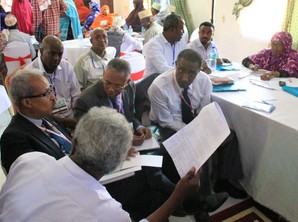Somaliland holds land reform conference

In the 24 years since its withdrawal from its union with Somalia in 1991, Somaliland has progressively developed into one of the most stable areas within the territory of the former Somali Republic. Although lacking international recognition as a sovereign state, Somaliland has developed a working political system, stable government institutions and a functional economy.
Land-based conflicts constitute one of the greatest threats to peace
Despite this relative peace and stability, there are still many challenges facing Somaliland in its statebuilding, social cohesion and development aspirations. One area that requires urgent attention is the growing number of resource-based conflicts, especially those over land. A 2013 study carried out by Interpeace’s partner organization, the Academy for Peace and Development (APD), indicated that land-based conflicts now constitute one of the greatest threats to peace in Somaliland. The study, carried out across Somaliland, established that an increasing number of violent conflicts in both urban and rural parts of Somaliland are rooted in individual and clan disputes over land ownership and use.
First ever national conference on land reform
It was in an effort to address the pressing issue of land conflict that APD organized Somaliland’s first ever National Conference on Land Reform on 21-22 April 2015. The objective of the conference - organized under APD’s Pillars of Peace Programme in partnership with Interpeace - was to bridge the gap between policy-makers and local communities and articulate a plan to establish effective land management mechanisms. An estimated 300 delegates, representing all sectors of the society, attended the conference, held over two days in the city of Burao. Among them were 11 ministers; all the governors of the regions of Somaliland; eminent traditional and religious leaders; mayors from various cities; representatives of youth and women’s organizations; local and international NGOs and other civil society groups; and representatives of international organizations.
Development of a draft roadmap on land reform
Following opening speeches and an evocative film on land conflict, participants were organized into four main working groups. The ministers and others with technical knowledge focused on elaborating a draft roadmap drawn up by APD to help the stakeholders navigate the various pertinent aspects of land reform. The other groups brainstormed on a more general vision for a successful land management policy, discussing the current challenge of land conflict and making recommendations for long term resolution. After the exercise, each group presented its recommendations, and the ideas gathered were grouped into short-term and medium/long-term recommendations. These were then integrated into the draft roadmap, which the government ministers took time to revisit and approve.
Regional consultations involved stakeholders across Somaliland
In the months prior to the National Conference, through participatory action research (PAR), APD organized a series of consultation workshops to seek input from stakeholders in all the administrative regions of Somaliland. The regional consultation workshops involved the participation of 480 people - 100 each in Hargeisa and Burao, and 70 each in Borama, Berbera, Las-Anod and Erigavo. In March 2015, APD also held high-level consultations in Somaliland’s capital, Hargeisa, with government and other key stakeholders, among them the relevant ministries and parliamentary committees, non-governmental groups and inter-governmental bodies such as UN-Habitat, the UN Food and Agriculture Organization (FAO) and the Rift Valley Institute (RVI).
Next steps towards land reform
With the success of the land reform conference and earlier consultations, the government and other stakeholders now have a strong foundation from which to pursue better land management. Next steps in the process include the articulation of a presidential decree; development of a National Land Policy, with effective land administration and conflict resolution structures; as well as elaboration of a fully integrated system of laws that govern all aspects of land management and use. APD will continue to help support and guide this process. The overwhelming support for the process thus far demonstrates a perceptible desire by Somaliland society and government to play their part to improve land management, and in so doing strengthen social harmony in Somaliland.
Click here to read APD’s official report of the land reform conference.
